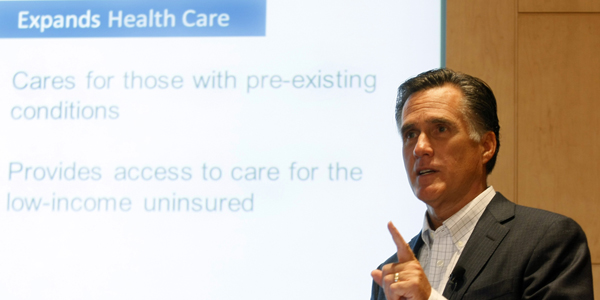Don't Be Fooled: Romney Has More Money Than You Can Possibly Imagine
With an outside group helping him, the candidate's own fundraising is only half the story

Thanks to recent developments in campaign law and regulation, the 2012 election will be like a phone booth with money swirling around in it and all of the candidates, including President Obama, grabbing for as many dollars as they can.
(More specifically, due to restrictions on coordination, it will work like this: Candidates will stand to the side, averting their eyes and politely asking donors for $2,500 at a time, the legal cap for giving, while the candidates' former advisers and fundraisers enter the booth, grabbing the cash, and not saying a word to the candidates about it. Winks, thumbs up, and long-range high-fives may or may not be exchanged. No one will talk about what happens in the booth, but everyone will see how many fistfuls of cash emerge, because those fistfuls will eventually be disclosed in Federal Election Commission filings.)
Mitt Romney is leading the money grab, hands down.
His campaign announced today that he has raised $18.25 million in the last three months, for a total haul of $18.8 million this election cycle. While not every campaign has yet disclosed its latest figures, Romney's nearest cash competitor is Rep. Ron Paul (R-Texas), who took in $4.5 million. Tim Pawlenty ($4.2 million) and Jon Huntsman ($4.1 million), trail. It's safe to assume no other candidate has come close to Romney's gigantic load of money: Had anyone approached it -- or simply known such an approach was plausible, when the fundraising quarter closed last week -- he/she would have told every reporter in sight.
Romney retains $12.6 million in the bank. He has given $52,500 of his own money to his campaign; during the 2008 election, he gave $63.73 million.
Multiple news outlets have pointed out that Romney fell short of his personal quarterly fundraising record of $23.5 million, set in the first quarter of 2007, when the 2008 presidential race was already heating up.
But Restore Our Future, an independent group of Romney supporters, has raised an additional $12 million to spend on his behalf -- meaning backers of Romney have donated a total of $30.8 million this cycle, and a total of $24 million (not counting Romney's own bank account) is sitting at the ready to be spent, at a moment's notice, to advance Romney's presidential ambitions.
Republican strategists with ties to Romney formed the group just two weeks ago and quickly set to work raking in unlimited donations -- a fundraising machine that operates far more freely than Romney's campaign.
While candidates can't receive corporate or union donations and can only take $2,500 per donor for a primary and another $2,500 per donor for a general election, groups like Restore Our Future can take as much as they want, including from corporate and union sources, thanks to a 2010 Federal Election Commission ruling that followed a few months after the Supreme Court's Citizens United decision.
The only tradeoff: The group can't talk to Romney about its fundraising or activities.
President Obama has a group like this too: Priorities USA, an independent group headed up by former Obama communications aide Bill Burton, will take in unlimited donations and spend it in support of Obama.
Romney is the only GOP candidate with a large-scale Super PAC hauling in ducats to buoy his campaign.
Outside groups found ways to help candidates in 2004 and 2008 -- Swift Boat Veterans for Truth, for instance -- but thanks to developments in campaign finance rules in the last year and a half, a new model has emerged, wherein Super PACs raise and spend money specifically to enhance the prospects of one politician, for the duration of a campaign. Before, outside groups filed tax forms as 501(c)4 nonprofits and claimed most of their activities were for issue advocacy. They couldn't dedicate a majority of their resources to campaign politics -- particularly, toward telling people explicitly to vote for or against a candidate. The new breed of Super PACs can.
Among GOP 2012 candidates, Romney is at the vanguard of this trend. When he announces his campaign fundraising totals, that's only half the story.
Image credit: Rebecca Cook/Reuters